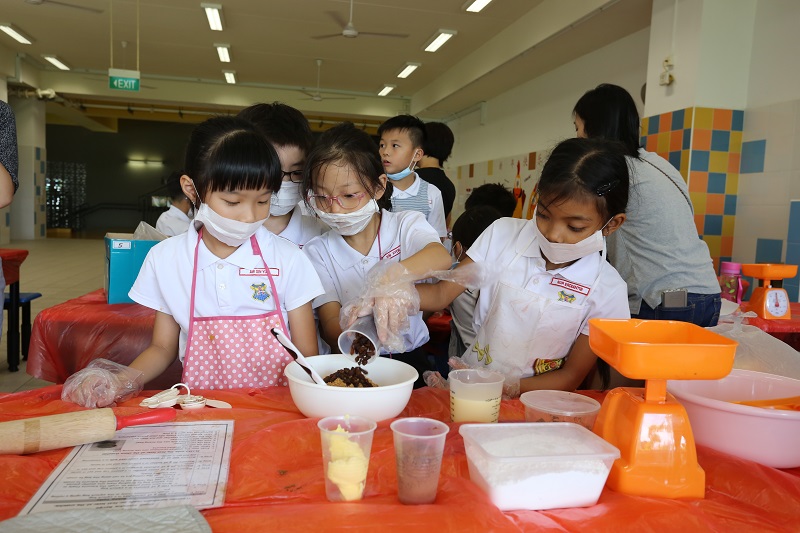Simon Sng, Westwood Secondary School, Outstanding Youth in Education Award 2017 Recipient
Going beyond the Classroom
As a Principles of Accounts teacher, I have observed my students struggling to make sense of financial knowledge. My previous appointments as an auditor and regional financial analyst convinced me that it is crucial for students to relate “school learning” to the real world.
Tapping on my work experience, I gave examples of audits I had conducted to illustrate the importance of having integrity and objectivity in the business field.
To make learning authentic, interactive, and fun, I took students to the school canteen, school bookshop and shops in the neighbourhood to learn about different types of businesses, and how assets are classified. They spoke with the owners and soon learned to describe the shops as “trading” or “service”, and items on their premises as “non-current” and “current” – basic knowledge that anyone interested in a business career should have.
I also organised learning journeys to companies such as AT&T and P&G. There, students learned various forms of income and expenses, and how innovation and financial literacy are crucial for both individuals and corporations.
My students loved these external learning experiences, even requesting to have one each term. Some were inspired to join these companies in the future.
Still, I went further. I held regular discussions with my students, and found out that playing computer games was their favourite pastime. That gave me the idea to use computer games such as Capitalism Plus and TradeHero to create competitive environments for students to apply their financial knowledge.
In Capitalism Plus, students set up virtual department stores, mined natural resources, built apartments to collect rental, and made advertising deals with television stations. I was surprised when many of them – even those who were usually not interested in the Principles of Accounts – approached me almost every day to request additional lessons so that they could have the know-how to unlock the next stage of their game “businesses”.
In TradeHero, students invested 100,000 virtual dollars in a portfolio of stocks. These stocks were picked based on their companies’ profitability and liquidity ratios, and other information the students gleaned from independent research. They had to monitor their portfolios, buying and selling in a timely fashion to maximise their returns.
It was heartening to hear that many of them continued to play these games after graduation, exchanging ideas, investment strategies and insights with one another. They even recommended these games to their friends and family members. From time to time, I get phone calls from parents that the game has enhanced the financial literacy in their children and many were beginning to show interest in business-related courses and careers.
Growing beyond School
To spur my students further, I led a team to organise the Innovation and Social Entrepreneurship Carnival.
Each year, the entire Secondary 2 cohort adopts a welfare organisation, sets up small businesses to raise funds for it, and raises awareness of the social causes it advocates. The funds would then be used to organise activities for the organisation’s beneficiaries, with the remaining amount donated to them.
“Mr Sng, could we organise a blind maze and sell tickets so our friends can experience being in total darkness, just like our visually handicapped friends?”
“Mr Sng, could we sell tea leaf eggs, muah chee, and traditional snacks as part of our National Education project to preserve cultural heritage?”
There is only one answer to all the above questions asked by students: “Why not?” The main purpose is to encourage them to be innovative in their pursuits, to have an enterprising mind-set, and more importantly, to feel a sense of possibility – that they can make things happen despite the challenges and obstacles they will face.
Glowing beyond Singapore
I often encourage my students to dream big. I tell them that they will not regret failing, but they might regret not trying. I advise them not to limit themselves, and to go as far as their minds will let them.
To walk the talk, we registered for competitions such as the National Design for Change Challenge Singapore, the FedEx International Trade Challenge, and the Hong Kong Polytechnic University Global Student Challenge.
“Mr Sng, do you think we could qualify?”
“Mr Sng, are you sure we can make it?”
“Mr Sng, we are just a school in the neighbourhood. This is an international competition, are you serious?”
No matter what, my answer remains the same. “Why not? It is not about winning, it is about the learning experience.”
And indeed, despite my students’ lack of self-belief, they conceived brilliant ideas. A bio-lamp for power-starved South Africa, a window air purifier for heavily polluted Beijing, a health-centric mobile application for busy Singaporeans, and a mobile café to provide a distinct dining and transportation experience for Singaporeans travelling into the city.
Cohort after cohort, they defied the odds, emerging victorious in the National Design for Change Challenge Singapore and the Singapore Management University Youth Innovation Challenge. They even represented Singapore at competitions in New York and Hong Kong.
Through developing an attitude of innovation, a spirit of entrepreneurship, and a desire to make a meaningful difference, I hope to empower my students with a sense of possibility to scale new heights.




.jpg)
.jpg)
